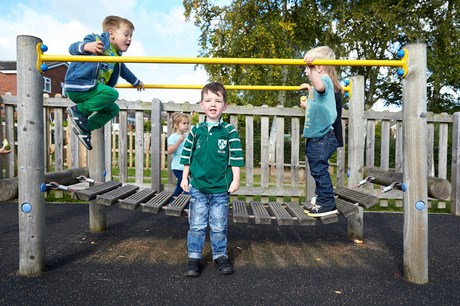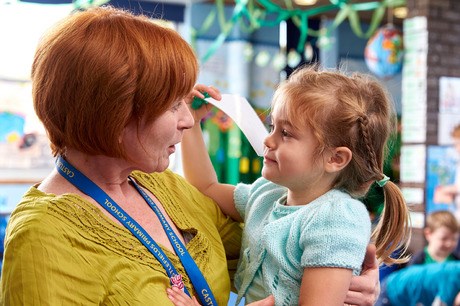EYFS Best Practice: All About...Summer-borns
Ruth Thomson
Monday, October 5, 2015
Children born in the summer are at a potential disadvantage when they start school, research shows. Charlotte Goddard looks at what you need to know

The current median school entry age in England, fourand- a half, is one of the earliest in the world. It is possible for a child to start Reception just days after their fourth birthday. Prospective mothers with a child due in August are often jokingly told to 'cross their legs' until September, and some even plan conception around the school year, so their child will not be one of the youngest.
ATTAINMENT CONCERNS
On an individual level, a child who is young for their year may thrive while an older child may need support. However, in general, extensive research shows an attainment gap between the youngest and oldest children (see 'More information').
At Key Stage 1, for example, the proportion of summer-born pupils achieving the expected level for writing is ten percentage points below the proportion of autumn-born pupils. Autumn-born pupils are more likely to rate their academic ability as 'very good' than their summer-born peers. While most research shows that the gap between summer- and autumn-born children tapers off as they progress through the education system, differences persist. In 2010, Government-commissioned research concluded that every year 10,000 summer-born children fail to achieve
the required standard at GCSE purely because they are the youngest pupils sitting the examinations.
A disproportionate percentage of are referred for special educational needs (SEN), with one 2003 study finding that 23 per cent of British summer-borns were classified as having SEN, compared with 15 per cent of autumn-borns.
Teachers may be misdiagnosing SEN by not taking into account a child's developmental age. The Summer Born Campaign, however, argues that the diagnoses are correct, but are caused by starting school too early, and thus avoidable. Research from the Institute for Fiscal Studies hasrelatively young children in school also found that summer-born children are two-and-a-half times more likely to report being unhappy at school, and twice as likely to report being bullied at the age of seven.
Premature children
Attainment concerns about young-inyear children are a particular issue for babies born prematurely, who tend to develop according to their due date, rather than their actual birthdate. If Katherine Dixon's daughter Alexandra had been born in September she would have started Reception this year as one of the oldest in her class - but being born five weeks early meant she had to start school last year as the youngest.
'Before she started, the school asked new pupils to draw a picture of their family, and at that stage she could only scribble,' says Ms Dixon. 'That showed me she wasn't really ready for school. She was still sleeping during the day.'
The school offered Alexandra halfday attendance for as long as she wanted, which turned out to be until the next spring, but Ms Dixon was worried Alexandra was comparing herself academically to older children in the class, giving her a false impression of her abilities. 'She would say "Mummy, I can't do joined up writing, and everyone else can",' she says.
GOVERNMENT POLICY:DEFERRED ENTRY
In response to all these concerns, the Government last month set the wheels in motion to ensure all children born between 1 April and 31 August will be able to start Reception class the September after they turn five, if that is what the parents want.
This option exists under the current system: school attendance is not compulsory until the start of the term after a child turns five. But parents have complained that while this was a legal option, schools and some local authorities did their best not to encourage it, placing deferring children straight into Year 1 or warning that they could be forced to miss a year later in their education.
Amendments to the admissions code last December left the decision of which year to place a five-year-old in up to the local authority, which is supposed to take into account the best interests of the child. But parents say some local authorities refused all cases of deferred entry to Reception, while others demanded expensive professional evidence to prove it was in the child's best interests.
Schools minister Nick Gibb says under the new rules deferring children will not be forced to miss a year at any point. The proposed changes are subject to a consultation, which will look at issues such as expected take-up, and will have to be approved by Parliament. But Mr Gibb has written to schools and local authorities encouraging them to take immediate action in implementing the policy.
Children whose entry is deferred will still be eligible for the 15 - rising, from 2016, to 30 - hours of free early education until they turn five, which could put pressure on nurseries, many already making a loss on the free places. But Claire Schofield, director of membership, policy and communications at the National Day Nurseries Association (NDNA), is not concerned. 'Nurseries will welcome the chance to support children who aren't ready for school in their setting for another year and we don't anticipate capacity issues,' she says.
Tim Oates, group director of Development at Cambridge Assessment, welcomes politicians have listened to evidence and are confronting this issue,' he says. However, he says deferred-entry children still need to be in a stimulating environment.
'If you have a summer-born child and hold them back, you have to think what they are doing in that year,' he says. 'If they are in a linguistically impoverished environment or limited in terms of the range of experiences open to them, that can be problematic.'
BEST PRACTICE
Settling in Best practice strategies designed to settle and support all young children will particularly benefit the very youngest. These include:
- home visits, which allow teachers to get to know children individually before they start school, and put support in place for them once they start
- flexible, part-time attendance packages for children who need them, developed with the child's parents
- allowing parents into the classroom for as long as necessary to settle their children
- putting children into classes with their friends - research shows this particularly helps the youngest
- strong links with early years providers - some schools have regular stay-and-play sessions attended by children from local pre-schools
- a classroom layout including comforting places where children can retreat to if everything becomes too much.
Awareness and assessment
The new baseline assessments, to be carried out in the first few weeks of Reception, could hamper settling-in, however, particularly for younger children for whom continuity is key. 'If a child is taken off and sat in front of a screen in their first few weeks and expected to do a test, that will work against the way you would want to settle a child in,' says Julie Fisher, independent early years advisor.
Increasing teachers' awareness of the potential influence of age effects would encourage them to take age into account when assessing educational needs and developing appropriate learning. Caroline Sharp, research director at National Foundation for Educational Research (NFER), says, 'One of the simple things that has been suggested is to have the register in birthdate order.'
She adds, 'It's a fine line, because teachers must take age into account but children may end up internalizing it as an excuse - "I'm the youngest so I'm not expected to do anything".'  Mixed-age classes bring a variety of benefits, including more effective assessments. Mr Oates says, 'I put my summer-born children in a half-formentry school where some in the class were two years older than others. In that situation, the teacher had to be aware of how to differentiate in terms of cognitive development.'
Mixed-age classes bring a variety of benefits, including more effective assessments. Mr Oates says, 'I put my summer-born children in a half-formentry school where some in the class were two years older than others. In that situation, the teacher had to be aware of how to differentiate in terms of cognitive development.'
Younger children could be given leadership opportunities and encouraged to value their own achievements rather than to compare their progress with that of older classmates.
However, some experts, including the Institute for Fiscal Studies and the NFER, say the most effective way to solve the 'birthdate penalty' for summer- born children would be to introduce age-standardised tests. These would make it explicit that an Augustborn child who reaches the level expected of their September-born classmate is not average, but is working a year ahead of expectations.
Co-located nurseries and Reception
Bringing nurseries and Reception classes closer together can make the transition between the two easier. Some schools have located their own nurseries next to Reception class, perhaps sharing an outdoor area, while others are combined for part of the day, or even completely integrated.
'When settings have good nursery units and children can move freely between Reception and Year 1, if it is all getting too much, that seems to work well,' says Mr Oates. 'Having the nursery unit next to Reception is the right way around.'
Developmentally appropriate curriculum
Central to meeting the needs of summer-born children is a developmentally appropriate curriculum, delivered by supportive practitioners who pay particular heed to the personal, social and emotional needs of the child. However, Reception teachers are coming under increasing pressure from policymakers and those further up the school to prioritise academic skills such as reading, writing and numeracy, to maximise attainment statistics.
'If the learning environment is appropriate there shouldn't be an age issue, but we face a tension for teachers in following the Early Years Foundation Stage (EYFS) principle of the Unique Child and targets that are set which allow for no difference between younger and older children,' says Ms Fisher.
Elaine Bennett, EYFS and Year 1 leader at Friars Primary School and Nursery in Essex, says, 'Unfortunately, in some schools, Reception teachers feel pressured to get results from above and perhaps management who do not understand the EYFS.'
'Children can end up doing activities that are totally developmentally inappropriate, such as long carpet sessions, worksheets and initiatives designed for older children. You have to be a strong practitioner to be able to stand up and say that is not appropriate for my children.'
Research led by Royal Holloway, published this summer, found that younger children often start school with inadequate language to meet the social and academic demands of the classroom. 'Starting school young may be less of a problem if the curriculum is more in line with children's developmental levels and more emphasis is placed on developing children's oral language skills,' says Professor Courtenay Norbury from the Department of Psychology at Royal Holloway. 'If curriculum targets are out of reach, problems with learning and behaviour may become entrenched.'
While nurseries and Reception classes both deliver the EYFS, nurseries have higher staffing ratios, making it easier to deliver play-based learning. Summer-born children, who would be in a nursery environment if their parents chose to defer their entry, particularly benefit from a higher number of adults in the classroom. Schools could consider spending their Pupil Premium money on extra staffi ng in Reception classes, but Ms Fisher warns that these adults must have a knowledge of child development and the principles behind early years learning.
'Younger children need to follow their interests and have skilled adults to bring out all the learning opportunities that come out of their activities,' she says. 'Often, schools chop up the day in ways that are very inappropriate to young children.
'One of the great problems for this age is interventions - children are too young to learn what is expected so they are suddenly seen as needing some sort of remedial help. So you have children who are struggling to cope with a school day taken out of the classroom, then brought back in, getting a disconnected experience when they most need continuity.'
As long as summer-borns are trapped by a curriculum or routines that fail to meet all their learning and developmental needs, then practitioners must make the children's well-being a priority, say experts.
'All disadvantaged children, and I see summer-born children as disadvantaged in our current educational system, need a positive attitude to themselves as a learner. We need to build their confidence, and their capacity to have a go and take risks,' says Ms Fisher.
If the new admissions policy is taken up, the disadvantages faced by the youngest children in the year may lessen. But not all summer-born children will take up the option to defer, and there is a need for future researchers to look at the approaches taken by schools that show a narrower agerelated attainment gap.
CASE STUDIES
Castlefields Primary School, Bridgnorth, Shropshire
Castlefields' nursery class is located next to its Reception class, which makes the transition to Reception less stressful for nursery children. 'Nursery and Reception children play together for a small session every day,' explains Jackie Hampson, head teacher at the school. The integration increases over the summer term, so next term's Reception children can familiarise themselves with their new environment. The nursery and
Reception teachers work together in planning the curriculum, sharing a topic but from a different angle - both classes are currently focusing on Jack and the Beanstalk.
Parents are encouraged to stay with Reception children who are not settling, but if the parent has to go the school will bring in school-age siblings or nursery staff to comfort them. 'We try to encourage children to come full time, but for the youngest children and those who are a little less confident we offer phased entry to help the child settle,' says Ms Hampson.
Annys Devereux's July-born daughter Nella started Reception at Castlefields last year. 'I was dreading her going to school as she had never really been left anywhere before,' says Ms Devereaux. Castlefi elds listened to Ms Devereaux's concerns and allowed Nella to attend part time, starting with two mornings a week and gradually increasing her hours until by Easter she was attending full time.
Ms Devereaux was able to stay in class with Nella, and also take her younger daughter. 'There was never any pressure to leave,' she says. Ms Devereaux was also impressed by the classroom, which has areas for children
to have a lie down if they need to.
Carterhatch Infant School and Children's Centres, Enfield
The play-based learning approach taken by 'outstanding'-rated Carterhatch Infant School means that every Reception child can learn at their own pace, according to their stage of development, rather than their age.
'Carterhatch looks at the developmental age of the child, taking into account their family situation and the pre-school experiences they have had,' says Ruth Moore, early years consultant at the school.
A school day at Carterhatch is unstructured. Children come together at the end of the morning and afternoon to share experiences, but for most of the day they are given access to a range of resources inside and outside, and can follow their interests.
Assistant head teacher for early years Anna Ephgrave comments, 'We have provided an environment where every child can get involved in whatever interests them, and the adults will join them in their pursuits and try to move that learning forward.'
The school conducts home visits with every child before they start. For the first week, half the Reception class attends for the morning and half for the afternoon every day. Most children attend full time after this, but if children are not ready part-time attendance can be offered. 'I believe Carterhatch's approach is good practice and if every school offered it then parents of summer-born children may not be so anxious,' says Ms Moore.
Friars Primary School and Nursery, Shoeburyness, Essex
The relationship between parents and school is key when it comes to supporting children, but especially those who are the youngest in their year.
'We carry out home visits to all Reception children before they start,' says Elaine Bennett, EYFS and Year 1 leader at the school. 'Parents are more likely to talk about concerns in their own home.' In addition, children at local pre-schools can come to a stayand-play at the school every Tuesday morning in the summer term to enjoy and explore the school environment.
The school always offers part-time attendance options for children not yet of compulsory school age, and parents are invited to stay for as long as they want if the child is not settling. Attendance is driven by the needs of the child, but usually involves attending for five days a week for the amount of time a child can cope with.
Most children who take up this option attend for half days, missing out lunchtime as the noise and formality of a school lunch environment can be stressful for young children. Others may attend for just an hour or half-hour, until they are ready to extend their day. 'Some might attend part-time for the whole year, although this doesn't tend to happen, as they are usually keen and asking to stay for full days when they feel ready,' says Ms Bennett.
The schools' three Reception classrooms are open plan, allowing children to move between different areas following their interests, with adults playing a role in building relationships and developing learning.
MORE INFORMATION
- Birthdate Effects: a review of the literature from 1990-on by Elizabeth D A Sykes, John F Bell, Carmen Vidal Rodeiro (2009), Cambridge Assessment
- International Thematic Probe: the influence of relative age on learner attainment and development by C Sharp, N George, C Sargent, S O'Donnell, M Heron (2009)
- Month of Birth and Education: schools analysis and research division, DfE (2010)
- Summer Born Campaign, http://summerbornchildren.org/home-2
- Younger children experience lower levels of language competence and academic progress in the first year of school: evidence from a population study' by C Frazier Norbury, D Gooch, G Baird, T Charman, E Simono_ and A Pickle, The Journal of Child Psychology and Psychiatry, (2015)








